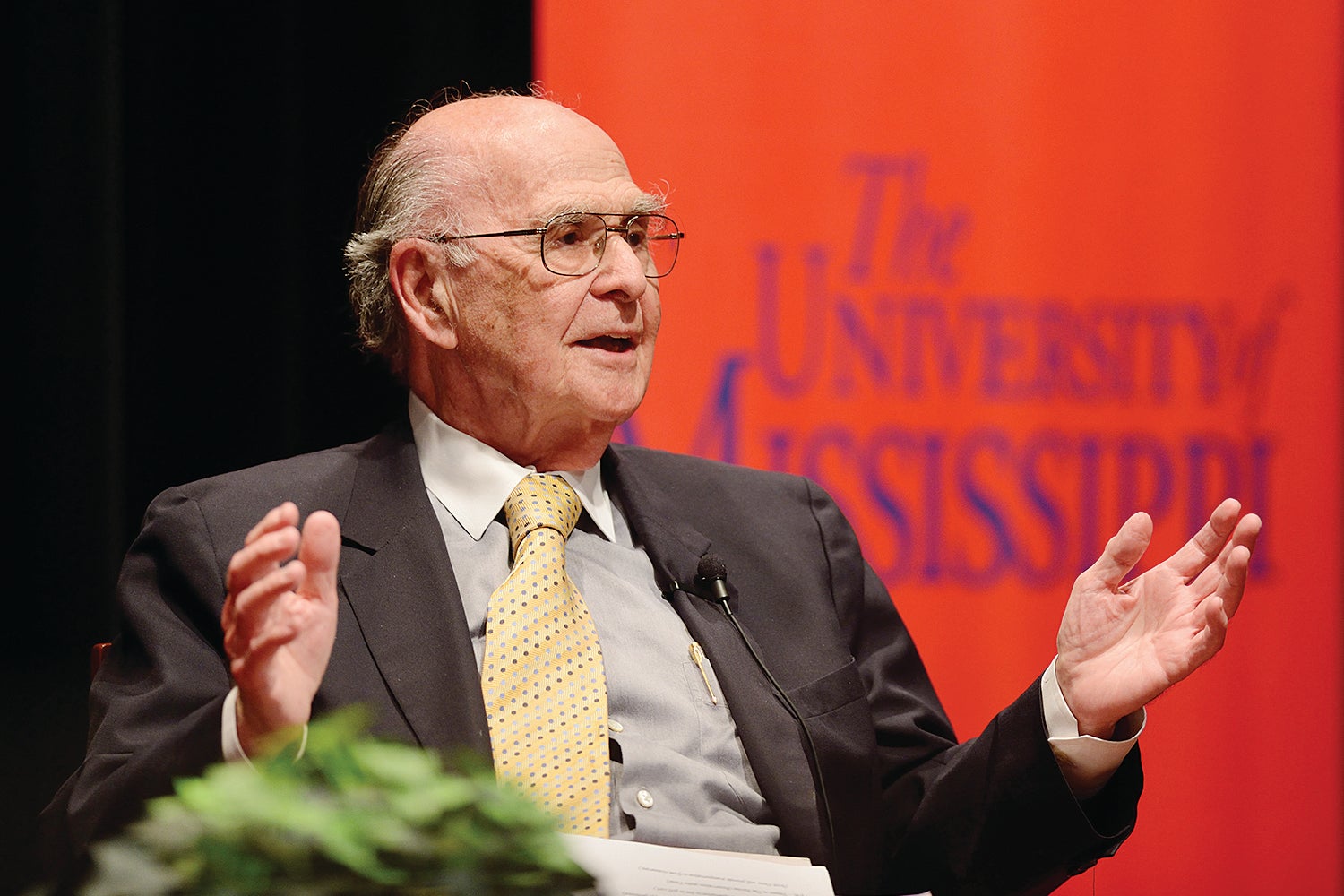Harold Burson, “Father of Public Relations,” dies at 98
Published 11:27 am Friday, January 10, 2020

- Harold Burson speaks during a panel discussion at UM in 2012. The Ole Miss alumnus and PR industry legend was inducted July 21 into the Southern Public Relations Hall of Fame. (Photo/Ole Miss Media Relations)
Harold Burson, a 1940 University of Mississippi graduate often heralded as the “Father of Public Relations,” has died at the age of 98. The Burson family made the announcement Friday in Memphis.
A Memphis native, Burson was an exceptional student, so much so that he entered Ole Miss at age 15. When he was 19, he served as a combat engineer in the U.S. Army, and in 1945, he worked as a reporter for the American Forces Network and was assigned to cover the Nuremberg trials after World War II.
Burson, who has been described by PRWeek as the 20th century’s “most influential PR figure,” founded the powerhouse public relations firm Burson-Marsteller with Bill Marsteller in 1953. The firm, which employs about 4,000, created the concept of total communication strategies that became the industry standard for decades.
“Our family is saddened by the loss of our beloved father. We grieve and mourn his passing. And yet our spirits are lifted by the belief that he is now ‘gathered’ with his loving wife and faithful companion of 63 years – Bette Ann. We pray they will now rest together for all of eternity,” the family said in a released statement.
Memorial services will be held in New York City and at UM. He will be entombed in the Columbarium at Arlington National Cemetery. In lieu of flowers, the family asks those wanting to celebrate his life to make a donation to the Harold Burson Legacy Scholarship Fund at the UM School of Journalism and New Media.
Friends, colleagues and “Burson Persons” all over the world are invited to leave a comment, an anecdote or a note of remembrance at the following email: mmburson99@gmail.com.
Burson was inducted into the Ole Miss Hall of Fame in 1980 and continued to be involved both with the university and the School of Journalism and New Media. He visited with future marketing and communications professionals last year during a guest lecture at the Overby Center for Southern Journalism and Politics.
Robin Street, UM senior lecturer in journalism, said that one of the joys of her career involved spending time with Burson and having him speak to her classes on several occasions.
“His name and significance in the PR world are some of the first things I teach my students in the Introduction to Public Relations class,” Street said. “I tell them that what Elvis Presley was to rock ‘n’ roll, Burson was to PR. He truly helped the profession evolve, change and grow.
“The last time he spoke was in October and he held the rapt attention of a room full of college students. That is something even few professors can do.”
In 1983, Burson-Marsteller officially became the world’s largest PR firm, with regional headquarters in New York, Sao Paulo, Hong Kong and London. His firm handled a number of major accounts.
Burson’s firm helped Johnson & Johnson with its response to the deaths of eight people who had taken tainted Tylenol in 1982. The company was not faulted, but it assumed responsibility and took the product off the market, which cost $100 million, and halted advertising. Representatives showed complete transparency and openness and made themselves available at all times to answer questions.
The response to the Johnson & Johnson case led to Burson being credited with creating the template for crisis management.
“A quote from him is even included in the textbook I use,” Street said. “It says, ‘In the beginning, top management (of the client company) used to say to us, “Here’s the message. Deliver it.” Then it became “What should we say?” Now, in smart organizations, it’s “What should we do?”‘”
Street had used the Tylenol case as a classic example in her classes for several years, unaware that Burson was the PR expert behind the response.
“But one day, when he spoke to my class, he casually mentioned, ‘When I was called in to help with the Tylenol case, …’” she said.
The British government called on Burson-Marsteller’s help during an epidemic of mad cow disease. He also counseled Union Carbide, the Three Mile Island nuclear plant after a famous meltdown in 1979 and BP after its Torrey Canyon oil tanker sank.
Burson-Marsteller merged with global communications firm Cohn & Wolfe in 2018. The resulting public relations giant, Burson Cohn & Wolfe, employs about 4,000 people worldwide.
His son, Mark Burson, is an instructional assistant professor of integrated marketing communications at Ole Miss.





